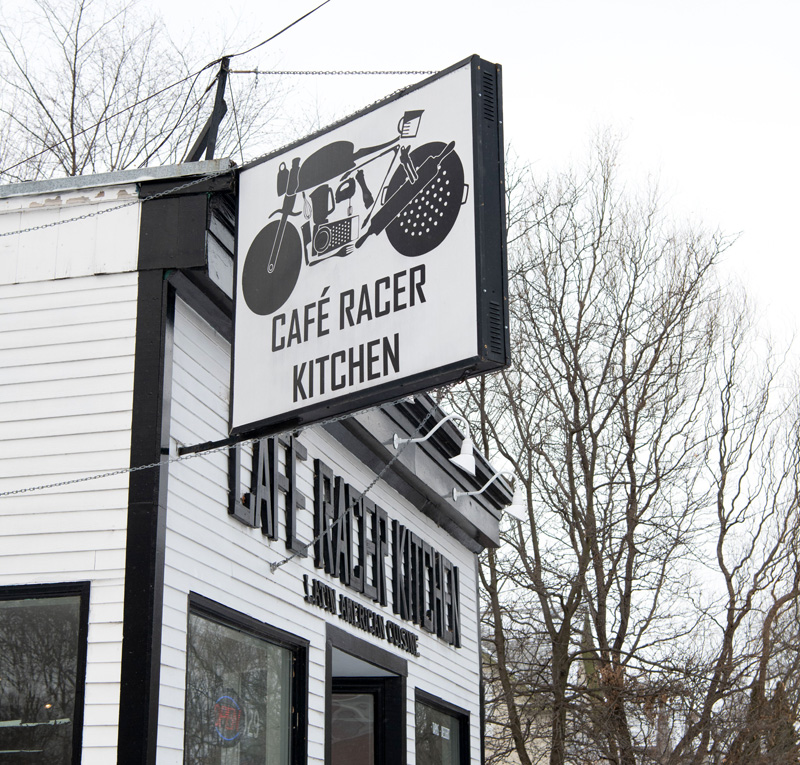PHOTOGRAPHS BY VICTORIA CAMPBELL / HEAVY TABLE
This story was originally published in our Churn newsletter. Support the Heavy Table on Patreon to get in-depth reviews, profiles, and more delivered to your inbox every Friday morning.
When Cafe Racer Kitchen announced last month that they would begin requiring proof of vaccination or a negative COVID test for indoor dining, it came as no surprise.
The motorcycle-themed Seward mainstay has been a beacon for its community since it first converted from food truck to brick and mortar in 2015, serving free meals via their Break Bread program, donating school lunches, and routinely raising money to support charities like the Florence Project. It’s social justice-minded practices like that that made Anthony Maki, a 31-year-old West Bank resident and activist, a frequent diner and advocate. When a local woman tweeted asking for Twin Cities restaurants requiring vaccines for entry, he quickly told her the news. That’s when a bystander chimed in.
“Don’t eat there,” they tweeted. “Pro-police and co-owned by a cop.”
Maki quickly retracted his recommendation, saying the discovery that Cafe Racer is co-owned by Minneapolis Police Department sergeant Christine Patiño left him feeling “deceived/betrayed.”
Cafe Racer owner and de facto face of the business Luis Patiño has never hidden the fact that his wife and business partner Christine is a detective with the Minneapolis Police Department. While Sergeant Patiño’s occupation might not have been as contentious back in 2013, when Heavy Table first covered the then-food truck, the past 8 years has awakened many to the historic misdeeds of the MPD, culminating with the murder of George Floyd by Derek Chauvin on May 25, 2020.
The city is still reckoning with the events of that day, with citizens called daily to re-evaluate their notions of policing and community. Maki’s experience is emblematic of the questions Minneapolitains are beginning to wrangle as ideas of reform and abolition become everyday conversation fodder. Put simply: can a business owned by a police officer provide real benefit to a community that police officers routinely victimize?
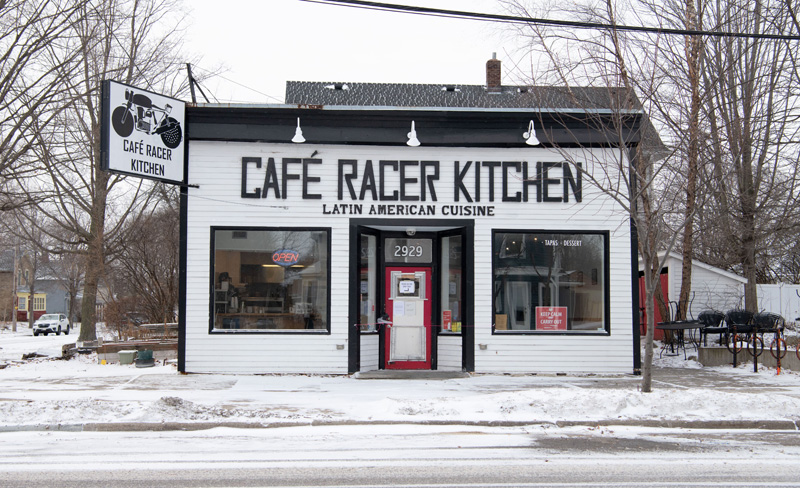
“It puts me into this sort of cognitive dissonance of like, some of the money I’m passing along to the business is going to economically support a cop,” Maki says. “I don’t know how I feel about that.”
CAFÉ RACER RESPONDS
Hearing about Maki’s dilemma is distressing for Patiño. But he recognizes the necessity of the question.
As a Colombian-born immigrant to the United States, he’s seen the oppression inherent in the American criminal justice system. He studied it as a paralegal. He opened his restaurant to help build equity in his own individual way: by giving access to food.
“My main focus is trying to use my skill set as [a chef] to do what I can,” Patiño says. “We are so past the idea of someone going hungry. I’m really hoping that I can be part of fixing that.”
The conversion around restaurants and civic responsibility has escalated dramatically in 2021. In July, fellow community-driven Seward restaurant Birchwood Cafe had a bizarre reckoning, and local breweries have been called to atone for their own history of discrimination. More than ever, patrons are looking for the businesses they support to reflect their values—and questioning those that appear to contradict them.
Christine has always been a part of the Cafe Racer, handling the business side while Luis runs the kitchen and dining room. She’s been a fixture in most of their press, but unlike The 1029 Bar or Alary’s Bar, being “cop-owned” was never part of their identity. Patiño outright rejects the assertion made on Twitter that they are “pro-police.”
He supports his wife, who works as a sex crimes detective, investigating “the worst parts of our humanity.” At the same time, he despises the institutional injustices the police uphold.
“I obviously do not support the police,” Patiño says. “I understand the necessity of having a group of individuals that provide a service for the community, but the history behind the situation that’s been going on in this country, the racism and the oppression and the lack of accountability, I’m not okay with that. I don’t represent that.”
Patiño built Cafe Racer out of his relationship with his wife, not her occupation. He credits her support for allowing him to leave his career and establish a restaurant that feeds the needy. Ultimately, he understands the conflict, and he respects people like Maki who can’t reconcile how those two things work together. But he hopes folks in Minneapolis can appreciate the nuance of his situation.
“I feel erased when people ask that question in regards to how my wife chooses to provide her form of justice for the rest of the world,” Patiño says. “I came here to bring arepas and my culture. Who I decided to marry and what she does to provide justice for the world, it sucks when that turns around and negates what I do.”
A SEAT AT THE TABLE
Cafe Racer set the standard for how a restaurant can serve their community in the era before the murder of George Floyd changed the city. After, Pimento Jamaican Kitchen & Rum Bar was the first to rise to it.
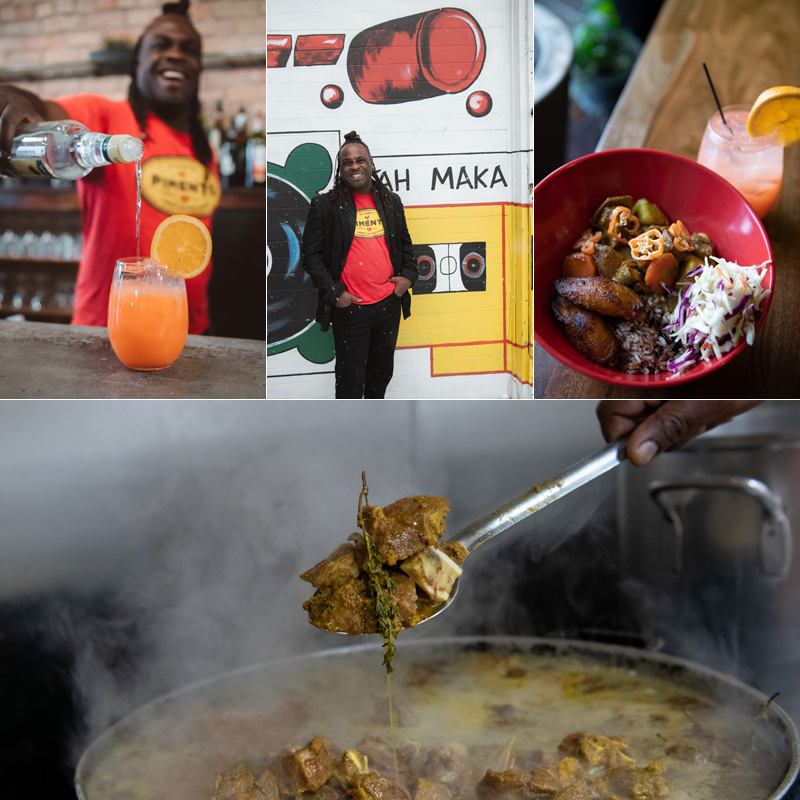
Like Cafe Racer, Pimento was also donating free meals as part of their COVID response prior to May 25, 2020, but the Jamaican restaurant has become one of the most visible terminals for mutual aid in the Twin Cities, taking in donations by the truckload over the summer. Pimento Relief Services SBC is now a certified B-corp that’s inextricable from the Eat Street establishment it grew out of.
Pimento and Pimento Relief Services founder Tomme Beevas comes to community activism in much the same way as Patiño. Coming from a Jamaican family, he was taught that if one person has a loaf of bread, they should feed the whole village with it.
“The role of restaurants is to provide nourishment, to provide sustenance, to our community,” he says. “People are out there struggling emotionally, struggling financially, just struggling. We want to ensure that we continue to be a safe space.”
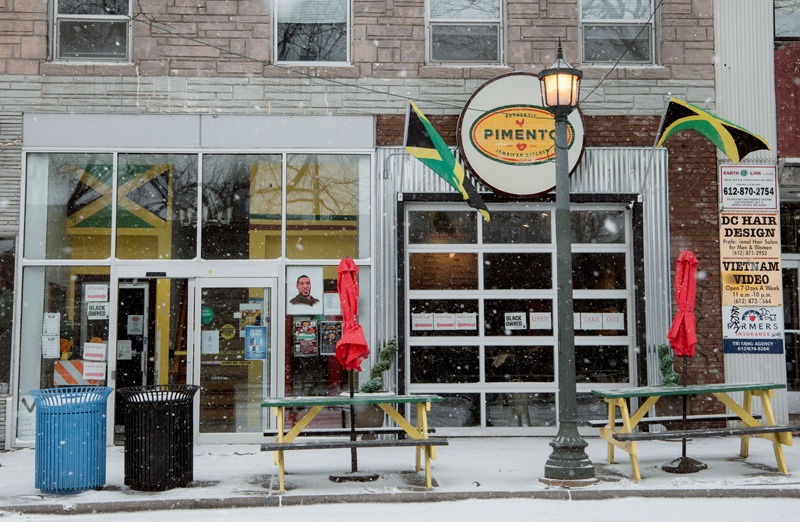
Despite his active role in mutual aid, Beevas considers himself a staunch capitalist, and under capitalism, customers have an obligation to support businesses that represent their values. If a restaurant is co-owned by a police officer, and that conflicts with a person’s ideal, they have a right to choose to go somewhere else.
But that doesn’t rectify the issues that stand between the public and the police. Beevas freely admits that he supported Question 2 to reform MPD under a Department of Public Safety. That referendum didn’t pass, and while the policing still exists in its current form, Beevas sees a place for officers in community businesses. They just need to do the work.
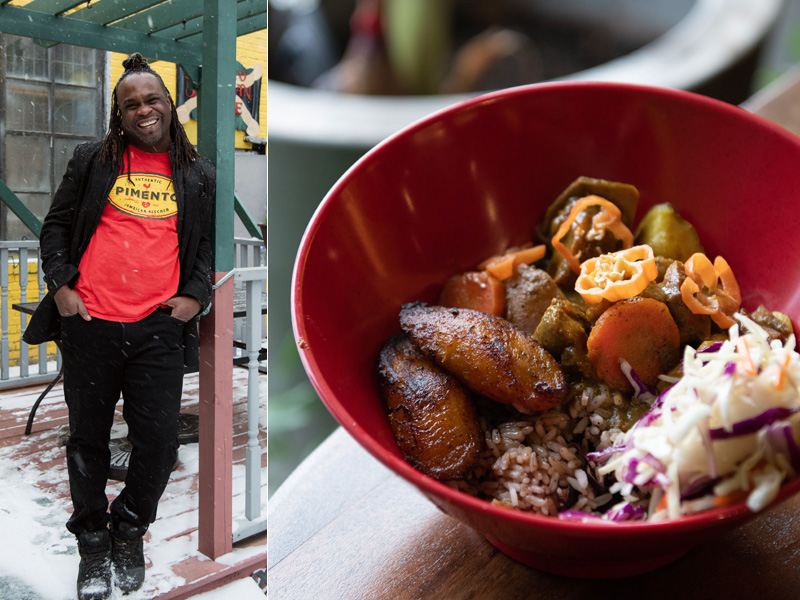
“Regardless of one’s job, ensuring that our community is safe and healthy is the job of every citizen,” Beevas says. “I’m in business, and my job is to know the voice of the customer, to listen and ensure that I’m meeting the needs of the customer. And so it is up to them to determine if they want to continue to be relevant. How do they listen to the voice of their customers?”
Beevas doesn’t address Patiño’s situation specifically, but he provides a useful rubric for anyone grappling with whether to continue their support of Cafe Racer: Is there net good? Are they being, as Beevas terms it, “excellent corporate citizens”?
“If you’re seen as causing harm, you should work doubly hard to ensure that you’re doing the opposite,” Beevas says. “If you’re going to own a business as a police officer, ensure that your business is also addressing some of the social ills.”

